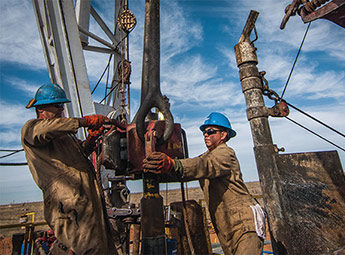Drilling down
OSHA and the oil and gas industry are partnering to address an upsurge in fatalities

Photo: International Association of Drilling Contractors
Worker culture
In Hurt’s opinion, the biggest safety challenge is workers – many of whom he said are young and believe they are invincible – taking chances that run counter to their training.
“The most frustrating part of keeping workers safe is employees willing to take that risk when they know they shouldn’t, resulting in them being injured,” he said. “I think most companies have good safety management systems in place.”
Some evidence suggests that workers’ safety culture is part of the problem. In Retzer’s motor vehicle study, half of the workers who died were proven or presumed to not have been wearing a safety belt. Researchers suggested the lack of safety belt use was tied to “the culture of the work environment” and cited a qualitative study in Canada that concluded risk-taking was a “fundamental characteristic” of the workers and work environment. Rather than always wearing their safety belt, workers made decisions based on situational factors, such as inclement weather, the researchers stated. They also suggested that the industry and local community should initiate efforts to encourage safety belt use among workers.
To help identify workers with a high tolerance of risk, Hurt said some employers conduct attitude testing prior to hiring. He is a proponent of behavior-based safety to help reduce risk-taking and improve compliance.
“Companies constantly have to readdress these things to keep the employees following the principles of behavior-based safety and looking out for each other,” Hurt said.
Customizing safety
Another issue may be the culture throughout the industry. Speaking about the uptick in fatalities, Shinert, whose department within Savage deals with refinery services, said the industry as a whole has traditionally not been very safety-conscious.
“There’s a lot of exemptions for oil field workers in the OSHA standards … and because of that the industry hasn’t had the focus on safety that it should have. And now that you’ve really expanded the field, plus you’ve put all this new blood into it, it’s really expanded the problem.”
He used the example of valuing production over safety. Some workers may feel pressure to get the oil out of the ground fast because the rig costs so much per day.
However, Shinert said Savage takes a different approach to safety culture. “Savage has figured out it’s not enough to just have a safety program,” he said. “You really have to ingrain safety as a value in your employees or else you’re going to miss the mark.”
Shinert’s workers face a variety of hazards: Process safety management is critical when handling the byproducts of refining services. Working at height presents the risk for slips, trips and falls. And transporting oil and gas materials requires following transportation safety requirements and knowing how to operate and work safely around loaders and excavators, he said.
The diversity of hazards means workers need a lot of training. Shinert cannot be everywhere, so he trains front-line workers to take on the additional responsibility of being safety specialists – who can identify potential hazards and create safety programs as needed.
“We’ve really customized safety,” he said. “Instead of it coming from the corporate office, we’ve reversed that role and allowed our teams to create safety plans and procedures that fit their environment, which is the way it should be. Because the reality is I can’t make anybody safer sitting here in the Houston office. … We have to rely on our safety specialist teams in the operations to keep everybody safe out there.”
Post a comment to this article
Safety+Health welcomes comments that promote respectful dialogue. Please stay on topic. Comments that contain personal attacks, profanity or abusive language – or those aggressively promoting products or services – will be removed. We reserve the right to determine which comments violate our comment policy. (Anonymous comments are welcome; merely skip the “name” field in the comment box. An email address is required but will not be included with your comment.)

